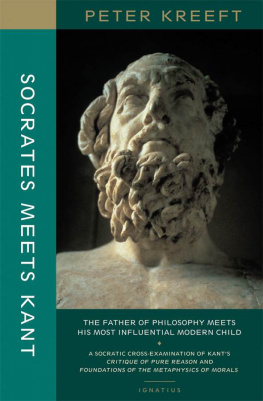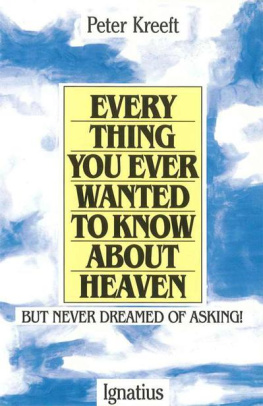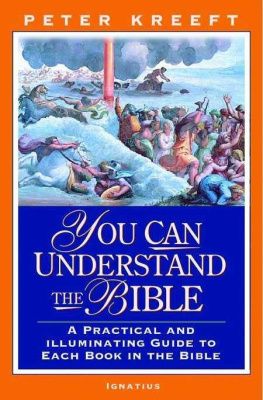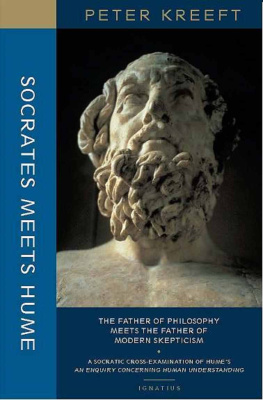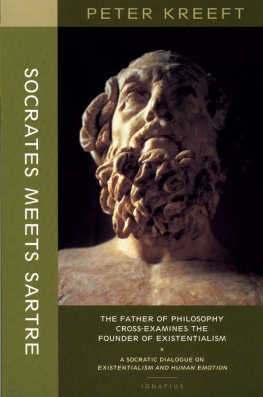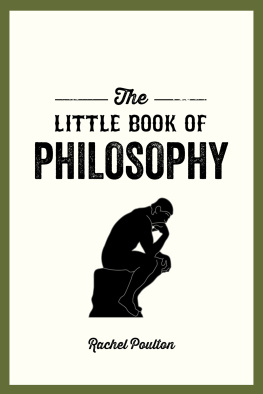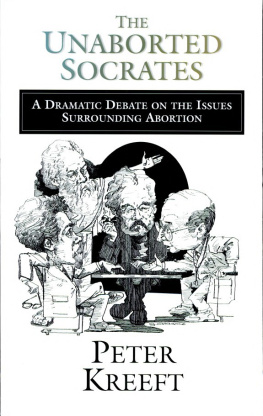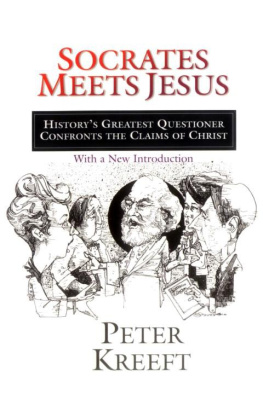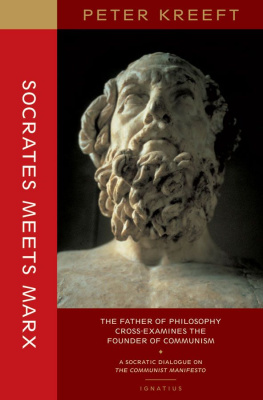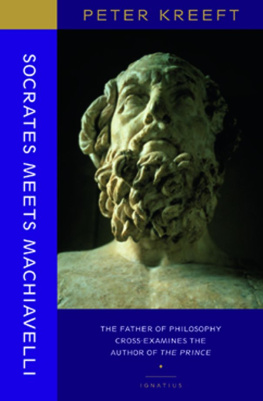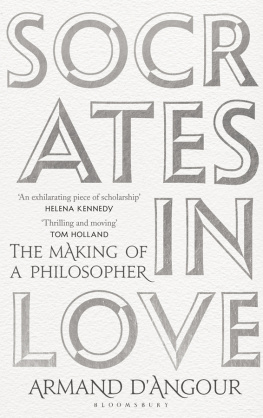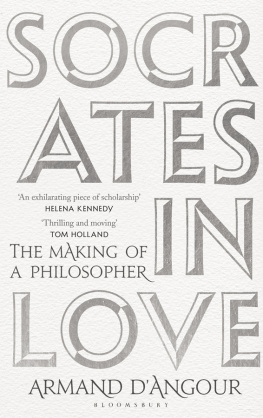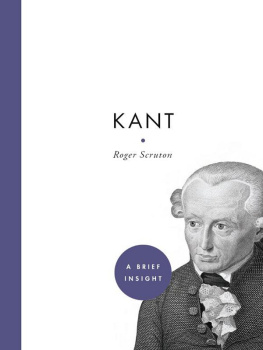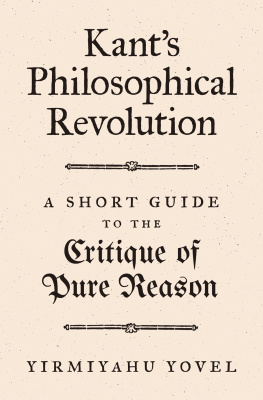Socrates Meets Kant
Socrates Meets Kant
______________________
The Father of Philosophy Meets His Most Influential Modern Child
A Socratic Cross-Examination of Kants
Critique of Pure Reason
and
Grounding for the Metaphysics of Morals
by Peter Kreeft
IGNATIUS PRESS SAN FRANCISCO
Excerpts have been used from the following books:
Heinrich Heine, Works (H). Translated by C. Leland, T. Brooks-bank, M. Armour (Boston: Dutton, 1906).
The Critique of Pure Reason (CPR). Translated by Norman Kemp Smith (London: Macmillan, 1958).
Grounding for the Metaphysics of Morals (G). Translated by James Wesley Ellington (Indianapolis, Ind.: Hackett, 1993).
On the Common Saying: This May Be Right in Theory, but It Is No Good in Practice (OCS).
Prolegomena to Any Future Metaphsyics (P).
Religion within the Bounds of Reason Alone (RB).
Kants Philosophical Correspondence: 1759-1799 (P Corr), edited and translated by Arnulf Zweig (Chicago, 1967).
The Critique of Practical Reason (Prac).
Cover art: Stone Head of an Ancient Greek (469-399 B.C.)
(classic sculpture)
The Louvre, Paris, France / Bridgeman Art Library
Cover design by Roxanne Mei Lum
2009 Ignatius Press, San Francisco
All rights reserved
ISBN 978-1-58617-348-7
Library of Congress Control Number 2008940377
Printed in the United States of America
For Ronald K Tacelli
Contents
Preface
This book is one in a series of Socratic explorations of some of the Great Books. Books in this series are intended to be short, clear, and nontechnical, thus fully understandable by beginners. They also introduce (or review) the basic questions in the fundamental divisions of philosophy (see the chapter titles): metaphysics, epistemology, anthropology, ethics, logic, and method. They are designed both for classroom use and for educational do-it-yourselfers. The Socrates Meets... books can be read and understood completely on their own, but each is best appreciated after reading the little classic it engages in dialogue.
The settingSocrates and the author of the Great Book meeting in the afterlifeneed not deter readers who do not believe there is an afterlife. For although the two characters and their philosophies are historically real, their conversation, of course, is not and requires a willing suspension of disbelief. There is no reason the skeptic cannot extend this literary belief also to the setting.
Introduction
Kant is really two philosophers: (1) the epistemologist of The Critique of Pure Reason and (2) the ethicist of the Grounding for for the Metaphysics of Morals [sometimes translated as The Foundations of the Metaphysics of Morals or Fundamental Principles of the Metaphysic of Morals]. Thats why this book is almost twice as long as the others in the Socrates Meets series. Thats also why I have modified Socrates style of argument a little bit and made it more short and direct than it is in Plato.
It is also longer because Kant is probably the most important philosopher since Thomas Aquinas. If he had written only half of what he wrote either half, the epistemology or the ethicshe would still be the most important and influential of all modern philosophers. As it is, his epistemology is truly the Copernican revolution in philosophy, as he termed it: the most fundamental revolution in the whole history of epistemology; and his ethics is the most important one since Aristotles. No other modern philosopher can rival his influence in either field, much less both. Only the revolution of Descartes in epistemology and the revolution of Nietzsche in ethics might be thought to rival that of Kant in being radical. Yet Descartes epistemological revolution was radical mainly in method rather than content, and it only paved the way for Kants much more radical, Copernican one; and Kants revolution in ethics was the necessary foundation to (unwittingly) pave the way for Nietzsches extreme reaction against it.
There are thinkers who accept the essential claims of Kants epistemology but not his ethics. There are thinkers who accept his ethics but not his epistemology. There are thinkers who accept both. And there are thinkers who reject the fundamental claims of both. This book is critical of Kant in both areas (though not equally critical: it is more critical of the epistemology than of the ethics) because that is what I think the position of the historical Socrates would be. Yet at the same time I think he would recognize Kants greatness, genius, genuine contributions, and profound rightness on many points.
My exploration of Kants ethics, in the second half of this book, is a close reading of the key passages in the Grounding for the Metaphysics of Morals in a kind of Oxford-tutorial type of Socratic cross-examination, as in my other Socrates Meets... books; and this is writable and readable because the Grounding for the Metaphysics of Morals is a conveniently short and readable book. But my exploration of Kants epistemology, in the first half of this book, is not a close reading of The Critique of Pure Reason, for that book is far too difficult for the beginning student to tackle, and far too long. It is also written in a heavy Germanic academic style that contrasts unfavorably both with the classical lucidity of other Enlightenment writers like Descartes, Hume, Voltaire, or Mill, and with the emotional enthusiasm and poetic eloquence of nearly all anti-Enlightenment writers, whether Conservatives like Burke or Romanticists like Rousseau or Existentialists like Kierkegaard and Nietzsche. So in the first, epistemological, half of this book I have merely summarized the most influential and revolutionary conclusions and arguments in The Critique of Pure Reason. This whole book, but especially the first half of it, is designed not for a dialogue with scholars but for the education of intelligent beginners in philosophy.
Many philosophers write long, difficult books and also shorter, more popular summaries of them. For instance, Sartre wrote not only Being and Nothingness but also Existentialism and Human Emotions. Hume wrote not only the Essay but also the Enquiry. Descartes wrote not only the Meditations but also the Discourse on Method. Marx wrote not only Capital but also The Communist Manifesto. Machiavelli wrote not only the Discourses but also The Prince. (And all five of these shorter, easier books are the subject of Socrates Meets... books in this series.) Kant too wrote not only the long and difficult Critique of Practical Reason but also the short and relatively easy Grounding for the Metaphysics of Morals. But Kant never wrote a clear and easy book in epistemology, though he did write a fairly short one, namely, the Prolegomena to Any Future Metaphysics. But both the literary style and the logical arguments in that book make it as difficult to read as the original, much longer Critique of Pure Reason. Beginners will despair; I do not want beginners to despair.
The Critique of Pure Reason is the most important philosophical book of modern times. It must be understood, and evaluated, even though it is one of the most difficult of all books to understand and therefore to evaluate. I found only one solution to this dilemma: to summarize the Critique, without expecting students to read it, before exploring the much more readable Grounding for the Metaphysics of Morals.
Introducing Kant Himself
KANT: (awakening after death, assessing his situation, and musing aloud). It seems I was both right and wrong about the afterlife. The soul is indeed immortal, as I believed. But apparently the body is too. And... it seems I am not alone. Who is this who comes to greet me? An angel? He is robed in white. But he is short and fat and ugly. He looks less like an angel than like a flatfish. Could it possibly be... Socrates?
Next page
